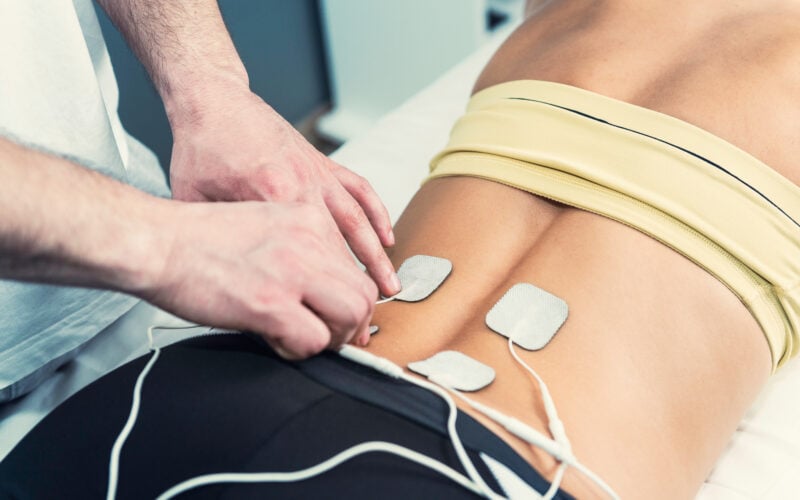Period pain is an all-too-common phenomenon believed by many to be normal. How many women have been told a version of “just take some ibuprofen and keep moving?” While some discomfort during periods can be normal, it’s important to realize that not all period pain is created equal. Pain so intense that it interferes with daily living warrants a trip to (or virtual visit with) a healthcare provider trained in restorative reproductive medicine (RRM). RRM-trained providers are well-equipped to treat period pain, instead of shutting down the menstrual cycle altogether via hormonal birth control.
For women with manageable but annoying period pain, a transcutaneous electrical nerve stimulation (TENS) unit may help. And while the only research study on TENS unit use for endometriosis pain was retracted (i.e., withdrawn by the research journal editor or the study’s authors), other studies have found it to be effective at managing period pain– which many women with endometriosis experience.
What is a TENS unit?
A TENS unit is a small, portable, battery-powered box connected to wires with pads (electrodes) that stick to your skin. Some units have two electrodes while others have four. The box sends tiny electrical pulses through the wires, causing a tingling feeling across the skin’s surface. Because a TENS unit can be applied throughout the day as you go about your daily routine, it may be helpful if you’re seeking a minimal-risk, noninvasive option for pain relief.
How can a TENS unit relieve pain?
To use a TENS machine, you place the pads directly over or near the location of the pain. The transcutaneous electrical pulses transmitted through the pads stimulate your nerves to help eliminate or lessen pain.
Why this helps to lessen pain is not well-understood. It’s thought that the pulses may tell the body to release endorphins, which naturally reduce pain sensations. Also, vibration (caused by the tiny electrical impulses) may travel faster than pain sensations, essentially outcompeting them for your brain’s attention.
How does a TENS unit help period pain or endometriosis pain?
The concept of using TENS units as a method of pain management is not a new idea. In the 1970s, TENS units were used to treat a number of aches and pains, ranging from muscular injuries to pain in childbirth. In recent years, TENS units have been increasingly marketed for period pain or cramps.
To use a TENS machine for period pain or endometriosis pain, you can place the pads on the lower abdomen near the pelvis and/or on the lower back. (Try multiple locations to determine where you get the greatest relief.) Once the machine is turned on, it will generate tiny electrical pulses through the wires, causing a pricking sensation on the skin.
Customizing your TENS unit settings for optimal pain relief
TENS units can generally be customized in three ways: how often the pulses happen (frequency), how long they last (duration), and how strong they are (intensity). Additionally, some TENS units allow customization of pulse patterns, meaning that you could choose a “burst” of pulses or steady delivery.
Frequency is measured in Hertz and it refers to how many pulses per second the TENS machine delivers. Higher-frequency TENS machines (50-120 Hertz) are most effective, according to a Cochrane review of research. This may be because the higher the frequency of pulses is better able to override the pain signals your body experiences.
TENS unit duration refers to how long each tiny pulse lasts. 50-250 milliseconds is a general recommended range for period or endo pain [1][2]. Intensity, or how strong the pulses are, can be adjusted down or up so long as the pulse isn’t so strong that it causes pain.
High-frequency impulses are key
For optimal effectiveness, a Cochrane Review on TENS use for period pain recommends using your TENS unit at a high-frequency, increasing the frequency as needed, for at least thirty minutes. A 2020 research study found that women using high-frequency TENS units for period pain were able to lessen their dose of pain-relieving pills such as ibuprofen, and some were able to rely on the TENS unit alone to treat period pain and cramps [1]. According to a 2002 Cochrane Review, low-frequency models have little to no effect on reducing pain. However, the duration and intensity of the TENS unit needed for pain relief can vary from person to person.
TENS units provide temporary period pain relief
This 2022 study found that period pain relief after TENS unit use lasted up to 7 hours [2]. In contrast, the 2020 study mentioned above reported that the TENS unit was primarily only effective at relieving period pain while in use [1]. You can use TENS as often as needed for period pain, but keep in mind that you may develop a tolerance over time [2]. To avoid developing a tolerance, vary the intensity and use the highest intensity you can tolerate [2].
Can every woman use a TENS unit?
Women with a defibrillator or other implanted medical device, women with seizures or epilepsy, and women with a heart condition should all check with a doctor before TENS unit use. If you’re pregnant, check with your doctor before use.
Women who are on prescription painkillers, specifically opioids like Hydrocodone or Norco, may benefit from high-frequency (but not from low-frequency) TENS unit use [1]. Low-frequency TENS unit impulses and opioid painkillers act on the same receptors in the body, but the painkillers have a stronger effect. In contrast, high-frequency TENS unit impulses may be effective for women taking opioids because they act on different, non-opioid pain receptors.
Would a TENS unit work for your endometriosis pain?
Endometriosis is often associated with extreme period pain (although it’s also true that some women with endo do not have painful periods at all!). And while the only study of TENS units specifically for endometriosis symptom relief was retracted, other studies have shown its effectiveness for treating period pain as well as chronic pelvic pain [3]. So, the rationale for TENS use to treat endo-related period pain is based on logic, but not yet backed up by research trials.
It’s possible that women with endometriosis-related period pain may need to use TENS units more often and at a higher-frequency than people without it. Additionally, endometriosis pain may still require ibuprofen or other pain relievers to help make the pain manageable– and it’s important to remember that pain management alone is not enough to treat the whole-body effects of endometriosis.
The bottom line
For some, a TENS unit may be an effective, noninvasive option for period pain management. The efficacy of the machine will depend on the level of pain you are experiencing, how often you use it, and the frequency of electrical impulses. Some people may be able to rely solely on the TENS unit for period pain relief; however, if you suffer from endometriosis or extreme period pain, you may still need additional pain relief like ibuprofen.
References:
[1] Elboim-Gabyzon M, Kalichman L. Transcutaneous Electrical Nerve Stimulation (TENS) for Primary Dysmenorrhea: An Overview. Int J Womens Health. 2020 Jan 8;12:1-10. doi: 10.2147/IJWH.S220523. PMID: 32021488; PMCID: PMC6955615. [2] Guy, M et al. “Transcutaneous electrical neurostimulation relieves primary dysmenorrhea: A randomized, double-blind clinical study versus placebo.” Progres en urologie : journal de l’Association francaise d’urologie et de la Societe francaise d’urologie vol. 32,7 (2022): 487-497. doi:10.1016/j.purol.2022.01.005 [3] Sharma, Nidhi; Rekha, Kaja1; Srinivasan, Jayashree K.. Efficacy of transcutaneous electrical nerve stimulation in the treatment of chronic pelvic pain. Journal of Mid-life Health 8(1):p 36-39, Jan–Mar 2017. | DOI: 10.4103/jmh.JMH_60_16Additional Reading:











